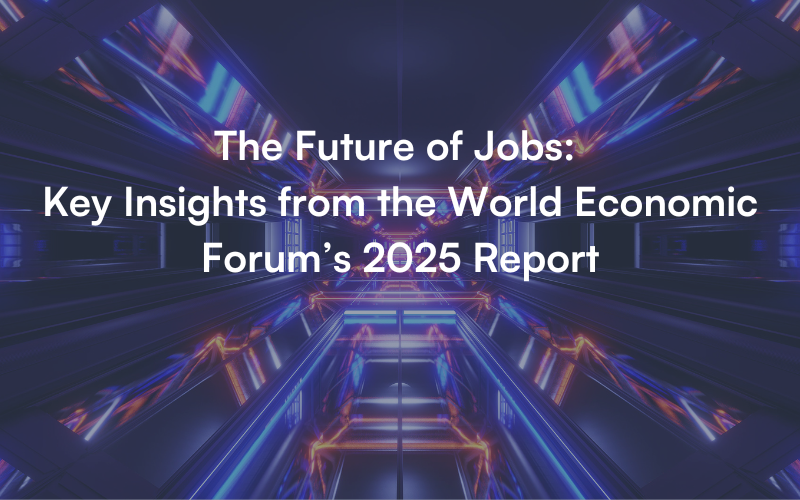The Future of Jobs: Key Insights from the World Economic Forum’s 2025 Report

The World Economic Forum’s Future of Jobs Report 2025 highlights how digital access, AI, and green technologies are reshaping jobs and skills by 2030.
As we approach 2030, the global labor market is undergoing transformative changes driven by technological advancements, economic uncertainty, demographic shifts, and the green transition. The World Economic Forum’s Future of Jobs Report 2025 provides a comprehensive analysis of these shifts, leveraging insights from over 1,000 leading employers representing 14 million workers worldwide. At Tech Talent Hub, we explore how these insights can empower tech companies to connect with top talent and future-proof their workforce strategies.
Top Drivers Shaping the Future of Work
- Technological Advancements
- Broadening digital access is expected to be the most transformative trend, with 60% of employers predicting its significant impact by 2030.
- Technologies like AI, robotics, automation, and energy innovations are driving both job creation and elimination.
- Demand for technology-related skills such as AI, big data, cybersecurity, and technological literacy is surging.
- Economic Pressures
- The increasing cost of living ranks as the second most transformative trend, with 50% of employers seeing it as a critical factor.
- Inflation and economic slowdowns are reshaping business strategies, driving demand for resilience, flexibility, and creative thinking.
- Climate Change and the Green Transition
- Climate mitigation and adaptation trends are creating roles like renewable energy engineers, environmental engineers, and autonomous vehicle specialists.
- Environmental stewardship has emerged as one of the fastest-growing skills, reflecting the rising importance of sustainability in business.
- Demographic Shifts
- Aging populations in high-income economies are fueling demand for healthcare professionals, while expanding working-age populations in lower-income economies are driving growth in education roles.
- Geoeconomic Fragmentation
- Geopolitical tensions and trade restrictions are pushing businesses to adapt, with one-third of employers anticipating business model transformations.
The Dual Impact on Jobs
Between 2025 and 2030, structural transformations are expected to create 170 million jobs globally while displacing 92 million, resulting in a net growth of 78 million jobs.
Frontline roles, care economy jobs, and education positions are anticipated to see significant growth. Technology-related roles such as AI specialists and big data experts are the fastest-growing in percentage terms, while clerical, admin and secretarial jobs face the steepest decline.
Skill Transformation and Workforce Reskilling
Workers can expect 39% of their existing skill sets to transform or become obsolete by 2030. To address this, 85% of employers plan to prioritize workforce upskilling, with 70% hiring staff with new skills and 50% transitioning employees from declining to growing roles. Analytical thinking, resilience, flexibility, and technological literacy are among the most sought-after skills, highlighting the need for lifelong learning and adaptability.
Talent Attraction and Retention Strategies
Supporting employee health and well-being has emerged as a top strategy for attracting talent, with 64% of employers prioritizing it. Effective reskilling initiatives and career progression opportunities are also critical for retaining top talent. Moreover, diversity, equity, and inclusion (DEI) initiatives have gained momentum, with 83% of employers reporting active DEI programs.
Implications for Businesses and Leaders
The future of work demands agile and forward-thinking strategies. Leaders must:
- Invest in Reskilling: With skill gaps being a major barrier to transformation, continuous learning and development programs are crucial.
- Embrace Technological Integration: Businesses should integrate AI and automation thoughtfully, balancing efficiency gains with workforce transitions.
- Focus on Sustainability: Prioritizing green jobs and skills will align businesses with global sustainability goals.
- Enhance Employee Well-Being: A supportive workplace culture will be pivotal in attracting and retaining top talent.
- Champion DEI: Expanding diverse talent pools will unlock untapped potential and drive innovation.
Conclusion
The findings of the Future of Jobs Report 2025 underscore the need for proactive workforce transformation strategies. At Tech Talent Hub, we specialize in connecting tech companies with top talent and equipping them to navigate these changes effectively. Whether you’re looking to attract skilled professionals, reskill your workforce, or implement DEI initiatives, our AI-powered platform and talent acquisition services are here to support your journey.
Source: https://www.weforum.org/publications/the-future-of-jobs-report-2025/digest/



Write A Comment
No Comments